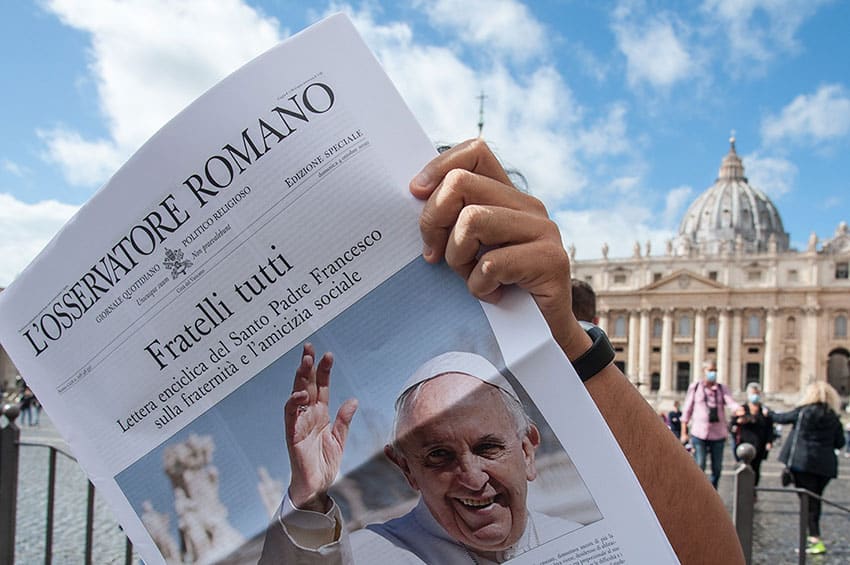
It is our many good works which should speak for us
On 11 January this year, Archbishop Mark Coleridge of Brisbane and President of the Australian Catholic Bishops Conference penned an article for America Magazine titled ‘Catholic Bishops can’t risk falling back on old tactics of political engagement’.
The Archbishop’s thesis is that in modern Western liberal democracies “popes and bishops have to reorder their relationships to the secular order”. This means, according to Coleridge, that “(N)ew circumstances will demand a new episcopal protocol and rhetoric, a new way of speaking and relating to the public domain. New wine, however strange and unpalatable, will require new wineskins”.
Regrettably he does not suggest what these new skins may look like nor a process of discernment amongst bishops as to how they intend to discover them.
The article demands an answer to a very profound question; why has the Church lost its voice in the political realm? This is a discussion worth having, so I want to offer some of my own reflections.
“This means, according to Coleridge, that ‘(N)ew circumstances will demand a new episcopal protocol and rhetoric, a new way of speaking and relating to the public domain. New wine, however strange and unpalatable, will require new wineskins’.”
First, clearly the sexual abuse scandal, the Royal Commission and the way it has been dealt with have led to a loss of credibility to speak on moral matters.
Second, the Catholic Church is the recipient of substantial funding from the public purse for education, health care and social services directed to her agencies. One should not bite the hand that feeds you.
Finally, I would suggest that we have lost both power and influence because of the topics we choose to engage with and the topics that are largely ignored.
As Mark Coleridge points out “ … bishops are quick to speak and act, for instance, on life issues (such as abortion and euthanasia), on religious freedom and on questions having to do with marriage and family. To those we might add sexuality and gender.”
Whilst I am not suggesting these are not valid, we hear much less about economic inequality, climate change, First Nations Peoples, refugees and asylum seekers, homelessness and a raft of other crucial issues that cause very real suffering for millions of Australians.

As a consequence, engagement with the media, both social and mainstream, and its reporting of bishop’s statements is almost non-existent. The matters that impact the broader community are not given meaningful time or energy by the Church.
Certainly Pope Francis has widened the issues for the universal Church in his Encyclicals Laudato Si’ and Fratelli Tutti but also in his actions for the poor, the marginalized and the outcast. How are Australian bishops emulating him?
If we were to take up the questions posed by Archbishop Coleridge, what might these new wineskins look like?
First and foremost the Church needs to be perceived for the integrity of its message. That is to say the words we proclaim must reflect our actions – ‘By their fruits you will know them.’ (Mt 7:16).
As a Church we not only talk about the dignity of the human person and a fundamental option for the poor but we act to bring it about; in our welfare agencies, our health care facilities, in dioceses, schools, parishes and in all of us as individuals.
So we speak about the wonderful work of our palliative care facilities and the extraordinary work and love of the professional women and men that work there, not just the morality of the euthanasia debate.
“First and foremost the Church needs to be perceived for the integrity of its message. That is to say the words we proclaim must reflect our actions – ‘By their fruits you will know them.’ (Mt 7:16).”
When we speak about the right to life we speak about the need to properly support single mums and impoverished families financially and through the community and we demand they receive the welfare they need; we don’t just speak about a right to be born.
When we respond to the Black Lives Matter movement we can point to our work to bring about reconciliation and healing between our Aboriginal and Torres Strait Island sisters and brothers and non-indigenous Australians.
Our support for refugees and people seeking asylum, caring for Creation through solar on schools, parish and diocesan properties, feeding and housing the homeless and so much more.

Our good works, our many good works, are the path to restoring credibility. These actions, while rooted in the Gospel are also political actions and by their nature they challenge entrenched power.
Second, and in light of this, we need to work with governments of all persuasion for the common good. We need engagement with the political process to be less adversarial and more co-operative bearing in mind that educating 20 per cent of the nation’s students and our massive investment in health care and social services is a point of power, not one of being indebted.
Next, we need engagement with the wider society through media. The 24 hour news cycle is difficult to break into unless you have a voice worth hearing.
“[W]e need to work with governments of all persuasion for the common good.”
Our bishops need a strong message amplified by talented and creative communications people (which requires a substantial financial commitment) and the ability to be nimble as issues arise.
Finally, perhaps we need to be more strategic about the issues we take to the public domain. Our bishops are a voice not just for the church but for justice in our society. If we are not speaking to the very real pain and suffering experienced by many in the broader community then there is little reason for our comment to be sought.
As Archbishop Coleridge has reminded us, engagement with “Western liberal democracies is the fruit of a long and complex history. At the heart of that history and beyond is the Gospel message. As we seek new modes of understanding and relating we hold firm to the Church’s tradition and the example of Jesus alive and active in and throughout history.”
Related articles:
